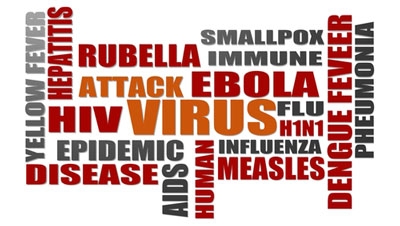
No more animal names like swine flu, monkeypox and mad cow. Avoid place names like Spanish flu, Rift Valley fever, West Nile virus, Lyme disease and Ebola (a river in the Democratic Republic of Congo).
Do not use people’s names like Chagas, Creutzfeldt-Jakob, Alzheimer and Lou Gehrig. And infectious maladies named after groups or occupations — Legionnaires’ disease and butcher’s wart — henceforth are out.
Concerned about the inaccuracies and stigmas that names of illnesses can confer upon people, animals, regions and economies, the World Health Organization on Friday announced “best practices” for naming new human infectious diseases. It called on “scientists, national authorities and the media” to heed the recommendations.
Under the W.H.O.’s guidance, a disease name should consist of a generic descriptive term based on symptoms (respiratory disease, watery diarrhea), who is afflicted (infant, juvenile, maternal), seasonality (summer, winter) and severity (mild, severe). The name can also include other factual elements like the environment (swamp, desert) and the year and month detected.
“The best practices apply to new infections, syndromes and diseases that have never been recognized or reported before in humans, that have potential public health impact, and for which there is no disease name in common usage,” the W.H.O. said in its announcement.
It emphasized that the recommendations “do not apply to disease names that are already established” and listed some of them as examples to avoid.
Disease names, the W.H.O. said, may not include geographic locations, people’s names, species of animal or food, references to culture, population, industry or occupation, and “terms that incite undue fear.”
Dr. Keiji Fukuda, the W.H.O.’s assistant director general for health security, said in the announcement that the recommendations were necessary because of the emergence of diseases that can create “unintended negative impacts by stigmatizing certain communities or economic sectors.”
He cited as examples swine flu, which many people falsely feared was spread by pigs, and Middle East respiratory syndrome, or MERS, which may have originated in the Middle East but has spread around the world.
The changes could lead to cumbersome new names that defy easy shorthand or headline writing.
In an inkling of what a new name could look like, the W.H.O. sought in 2011 to standardize the terminology for the virus responsible for the 2009 swine flu pandemic, calling it A(H1N1)pdm09.
“This is the first time that the W.H.O. has issued recommendations on what to do and what not to do” concerning new disease names, Olivia Lawe Davies, a W.H.O. spokeswoman in Geneva, said in a telephone interview. The recommendations were devised after consultations with other organizations.
They also were created with help from experts leading the International Classification of Diseases, a system that will still determine the final technical names of newly discovered diseases, the W.H.O. statement said.
The news was welcomed by officials who had seen the damage that a disease’s name can cause.
Old Lyme, Conn., for example, still suffers the aftereffects of a tick-borne disease that first sickened children and adults in the 1970s. It became known as Lyme disease, although it was subsequently found nationwide.
Dr. Jewel Mullen, the public health commissioner in Connecticut, said the W.H.O.’s new recommendations would “help counter stigmatization and faulty assumptions made by the public and decision makers when addressing emerging infectious diseases.”
Swine flu has been a recurring problem for decades. In 1976, a deadly strain thought to be related to the one that caused a 1918 pandemic infected soldiers in Fort Dix, N.J. The 2009 strain — a mix of a gene from a Eurasian pig flu with genes from a human flu, bird flu and North American pig flu — raised unfounded fears that pigs were transmitting the disease. Egypt, in a misguided move, wiped out its entire pig population. Consumers elsewhere feared eating pork and prices plunged.
At the National Pork Board, an industry group in Des Moines that has been fighting the term swine flu, its top animal health executive, Jennifer Koeman, said Friday that the W.H.O. recommendations would help “prevent that needless confusion and misunderstanding that can occur.”
